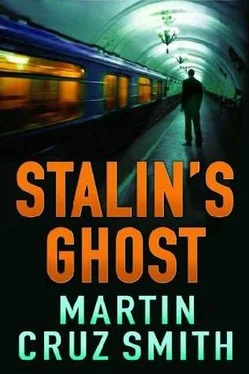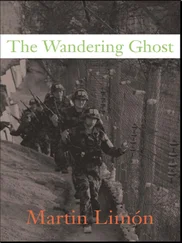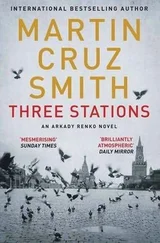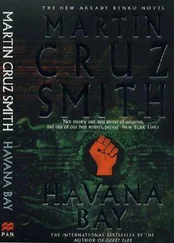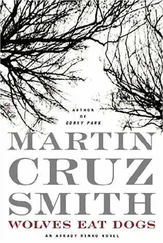Martin Smith - Stalin’s Ghost
Здесь есть возможность читать онлайн «Martin Smith - Stalin’s Ghost» весь текст электронной книги совершенно бесплатно (целиком полную версию без сокращений). В некоторых случаях можно слушать аудио, скачать через торрент в формате fb2 и присутствует краткое содержание. Жанр: Триллер, на английском языке. Описание произведения, (предисловие) а так же отзывы посетителей доступны на портале библиотеки ЛибКат.
- Название:Stalin’s Ghost
- Автор:
- Жанр:
- Год:неизвестен
- ISBN:нет данных
- Рейтинг книги:4 / 5. Голосов: 1
-
Избранное:Добавить в избранное
- Отзывы:
-
Ваша оценка:
- 80
- 1
- 2
- 3
- 4
- 5
Stalin’s Ghost: краткое содержание, описание и аннотация
Предлагаем к чтению аннотацию, описание, краткое содержание или предисловие (зависит от того, что написал сам автор книги «Stalin’s Ghost»). Если вы не нашли необходимую информацию о книге — напишите в комментариях, мы постараемся отыскать её.
Stalin’s Ghost — читать онлайн бесплатно полную книгу (весь текст) целиком
Ниже представлен текст книги, разбитый по страницам. Система сохранения места последней прочитанной страницы, позволяет с удобством читать онлайн бесплатно книгу «Stalin’s Ghost», без необходимости каждый раз заново искать на чём Вы остановились. Поставьте закладку, и сможете в любой момент перейти на страницу, на которой закончили чтение.
Интервал:
Закладка:
Isakov turned wearily to the hotel. He paused in the restaurant to wake the waiters and pay them, generously by their expressions, and took the elevator. The room on the second floor was still lit. It brightened briefly as a door opened and closed, and Arkady got a sense of bodies in motion.
More he didn’t want to know.
20
A drab world came out of the dark: an abandoned field of winter wheat bordered by scrub and brambles on three sides and, along the bottom, a dirt road that led to willows and fog.
The Rudenkos left their truck at a broken-down gate. Arkady had followed on the Ural and the three marched with flashlights and a wheelbarrow full of hemp sacks and tools to a mound of loose earth. Big Rudi seemed rejuvenated by the morning air: perhaps crazy, Arkady thought, but not the befuddled grandfather of the night before. The old man aimed the flashlight on the mound while Rudi selected a shovel and set to work, moving the loose dirt aside. The Ural had nothing as fancy as an odometer, but Arkady guessed that they were about fourteen kilometers south of Tver.
As the sun broke from the horizon the field developed contour and dimensions, about two soccer fields’ worth of flattened grass and sodden earth, a reminder that winter had started heavy with snow. The men’s shadows seemed to stand on stilts and a massive shadow spread from a stand of pine trees in the middle of the field. The trees must have been an impediment to farm machinery; Arkady wondered why they hadn’t been pulled as saplings.
Military camos were the dress code of the day and Arkady had borrowed a uniform from Rudi, who said, “Renko, you look like a POW.”
“No, a general,” Big Rudi insisted.
The sun up an hour, Rudi was using a pick to pry the earth around a skeleton lying on its side.
“Ours or theirs?” Big Rudi asked.
“Can’t tell yet,” said Rudi. He added for Arkady’s benefit, “This weather is fantastic. This time of year the ground is usually frozen solid. This is like cutting cake.”
“Check the teeth.”
“Present and accounted for.”
“But you think it’s December ’forty-one?” Big Rudi asked.
Every schoolboy knew that in December ’41 Stalin performed his greatest miracle. The Red Army had lost four million men dead and wounded. The Germans were on the outskirts of Moscow. Leningrad was under siege, its population starving to death. Tver, which was the center of the entire front, had already fallen. And then, incredibly, the Russians counterattacked. Stalin had secretly moved hundreds of tanks and thousands of troops from Siberia to the low hills outside Tver. This new army, seemingly created out of thin air and launched in the middle of a snowstorm, was a total surprise to German intelligence. The Red Army crossed the frozen Volga and chased the Wehrmacht for two hundred kilometers. Not only was Tver liberated and thousands of Germans killed and captured, they no longer resembled a superrace. The shape of the front changed. The nature of the war changed. The enemy stalled outside Moscow, never to threaten it again.
Two women, bent over and, blinkered by their shawls, moved along the far side of the field gleaning stunted potatoes that had been left to rot. Crows strolled behind. When the women saw Rudi they crossed themselves and left. Arkady wondered whether Big Rudi had stood in the same scene with tanks belching black smoke and Siberian riflemen moving across the river.
“There are Red Diggers and Black Diggers,” Rudi said. “Red Diggers find the bodies of Russian soldiers so they can send the remains home to be reunited with their families. Black Diggers find bodies, German or Russian, and strip them of medals, belt buckles, SS gear, any shit they can sell on the Internet.”
As the shape of a skeleton became evident at his feet, Rudi probed the bottom of the hole with a metal rod attached to a wooden pole.
“Remember that you’re not only digging up bones, you’re digging up unexploded shells, mines, hand grenades, booby traps, Molotov cocktails. Before you dig anywhere, take the rod and feel around. You do it enough, you can tell what you hit, wood, metal or glass. Every year somebody gets a big surprise. Well, we’re provoking it, aren’t we? Provoking the past.”
Satisfied, Rudi exchanged the pole for a spade and shaved the walls of the hole for elbow room. The man was a human power shovel, Arkady thought. Rudi’s friend Misha arrived with a metal detector and began sweeping the field, but not before he pointed to cars and vans arriving on the dirt road. “Diggers.”
Rudi said, “That’s okay. They had to load up with shish kabobs and beer. We got here early and the early bird got the worm, right?”
“So to speak,” Arkady murmured.
“There’s enough to go around, all skeletonized and picked clean.” Rudi scooped dirt with a short spade. “Bodies in trenches, bunkers, outhouses, you never know where. The first one I ever saw was up in a tree. I was out skiing on my own. I guess the body got tangled in the branches and the birch grew and lifted it until the body could grin down from the sky. I was eight years old.”
Men and boys streamed through the gate onto the field like an army with portable tables and hampers of food, bed rolls and tents, metal detectors and guitars. Not everyone was in camos, but it was the best way to blend in.
Arkady said, “If they don’t find anything they’re going to be very disappointed. How do they know where to dig?”
“They follow Rudi,” his grandfather said.
“And how do you know?” Arkady asked Rudi.
Rudi freed a clavicle and chose an ice pick to work around a tea-colored rib cage. “I study old war plans, maps and combat reports. I ride around on my bike and I know what to look for. A lilac bush where a house once stood. Depressions where the earth settled. Anything out of place, such as pine trees in the middle of a wheat field. Trees were a favorite way to hide a mass grave. Besides, I can feel it.”
“How big is this grave?”
“Big. Before they ran, the fucking Germans killed a lot of prisoners. Anyway, the Diggers will scratch around, work up an appetite, build some campfires, get drunk and sing songs. Tomorrow is the big day, when they dig in the trees.”
“Why wait until tomorrow?”
“Television. It had to fit their schedule.”
“Is it Fritz?” Big Rudi stared down at the hole.
“Well, Granddad, there’s no ID, medals or shoulder bars.” Rudi knelt. The uniform was brown gauze that disintegrated in his hands. “He’s not from a tank crew. Too big. They’re short and broad-shouldered because they have to be small enough to fit in the tank and strong enough to open the hatch. Also, they tend to be fried to a crisp. So, who are you?” Rudi asked the bones directly. “Are you Fritz or Ivan? Do you have a picture of Helga or Ninochka?”
“Check him for foot wraps,” Big Rudi suggested.
Russian soldiers had wrapped cloth around their feet instead of wearing socks.
“No feet,” Rudi reported. “No legs. Cut off at the knees. Not a very neat job, either. Probably blown off and then trimmed. Poor bastard, to go through that in the middle of a battle. That’s what happened.”
“What you think?” Big Rudi asked Arkady.
“I wouldn’t know.”
“Go ahead,” Rudi said. “You’re the investigator from Moscow.”
“I’m not a pathologist.”
“Don’t be scared. It won’t bite you.”
Arkady squatted by the edge of the hole.
“Well, a fairly young, fit man, a little less than two meters tall. Good nutrition. The ring finger of the left hand is missing, so I’m supposing that he was married and had a gold ring. As for the legs, I suspect they were taken for their boots.”
Читать дальшеИнтервал:
Закладка:
Похожие книги на «Stalin’s Ghost»
Представляем Вашему вниманию похожие книги на «Stalin’s Ghost» списком для выбора. Мы отобрали схожую по названию и смыслу литературу в надежде предоставить читателям больше вариантов отыскать новые, интересные, ещё непрочитанные произведения.
Обсуждение, отзывы о книге «Stalin’s Ghost» и просто собственные мнения читателей. Оставьте ваши комментарии, напишите, что Вы думаете о произведении, его смысле или главных героях. Укажите что конкретно понравилось, а что нет, и почему Вы так считаете.
